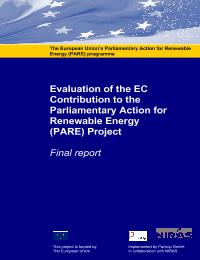
Evaluation of the EC Contribution to the Parliamentary Action for Renewable Energy (PARE) Project
Completedon 15 Dec, 2014
Evaluation Plan
Planned End Date
Dec 2014
Evaluation Type
Project
Management Response
Yes
Evaluation Budget
$25,000
Evaluation Title
Evaluation of the EC Contribution to the Parliamentary Action for Renewable Energy (PARE) Project
Plan Period
Status
Completed
Type
Project
Plan Date
3 Dec, 2014
Completion Date
15 Dec, 2014
Budget
$25,000
Expenditure
$25,000
Source of Funding
European Commission and Danish Ministry of Foreign Affairs
Management Response
Yes
Quality Assessment
No
Joint Programme
No
Joint Evaluation
No
GEF Evaluation
No
Stakeholders
Parliamentarians
Countries
Bureau for Policy and Programme Support
Plan Period
Status
Completed
Type
Project
Management Response
Yes
Plan Date
3 Dec, 2014
Quality Assessment
No
Completion Date
15 Dec, 2014
Joint Programme
No
Joint Evaluation
No
Budget
$25,000
GEF Evaluation
No
Expenditure
$25,000
Stakeholders
Parliamentarians
Source of Funding
European Commission and Danish Ministry of Foreign Affairs
Countries
Bureau for Policy and Programme Support
Output 2.2. Institutions and systems enabled to address awareness, prevention and enforcement of anti-corruption measures across sectors and stakeholders
Output 2.4. Frameworks and dialogue processes engaged for effective and transparent engagement of civil society in national development
1: Crisis Prevention & Recovery
2: Cross-cutting Development Issue
3: Democratic Governance
4: Environment & Sustainable Development
5: Others


